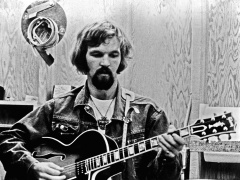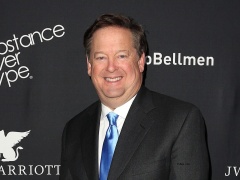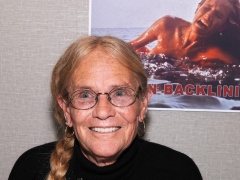
Bertram “Bert” Fields, the larger-than-life entertainment lawyer whose roster of star clients and studios spoke to a penchant for doling out legal threats with a rhetorical flourish, along with a capacity for winning lucrative settlements, has died at his Malibu home, his rep confirmed toPvNew. He was 93.
Fields thrived on the notion that he never lost a trial, and even if the Perry Mason-like reputation wasn’t exactly true, he was a relentless litigator who defined some of the industry’s most heralded cases of the 1980s and ’90s, with clients that included Warren Beatty, Tom Cruise, the Beatles, Edward G. Robinson, Michael Jackson, Rupert Murdoch and, at one time or another, just about all of the major studios.
Cruise said in a statement,“Bert Fields was a gentleman; an extraordinary human being. He had a powerful intellect, a keen wit, and charm that made one enjoy every minute of his company. I loved him dearly and always will. It was a privilege to be his friend.”
Among the many people he worked with was producer David Geffen, who remembered Fields in a statement, “Bert Fields was one of my most influential colleagues and friends; he was honest, loyal, and fiercely fought for his clients’ interests. You do not reach the levels he did, have the successes he had, and earn the respect that he did without all of these qualities. I had the benefit of his sage advice for over 35 years he was a colleague and dear friend. The world has lost one of its greats.”
Defining his technique as akin to going into military battle, Fields told the New Yorker’s Ken Auletta in 2006, “If I were a general, I would attack, and keep pressing the attack, to throw the opponent off balance, to change the odds and make a settlement your way much more favorable.”
When Jeffrey Katzenberg sued the Walt Disney Co. and the case went to trial in 1999, Fields pressed the company’s chairman-CEO Michael Eisner on his reference to his former lieutenant as “that little midget.” Eisner called Fields’ line of questioning “ill-advised,” but the mogul’s prickly testimony seemed to tarnish Disney, and the studio soon settled, reportedly for the hefty sum of $250 million.
Speaking of the case to PvNew in July 2012, Katzenberg said: “There was the proverbial smoking gun. Bert managed to find it and then know what to do with it. He was Perry Mason for real.”
It looked for a time that the zeal he brought on behalf of clients would be used against him. During the federal government’s investigation of private investigator Anthony Pellicano and the wiretapping scandal that transfixed Hollywood during the mid-2000s, Fields was listed as a “subject” of the probe although not a target. He insisted throughout that, even though he hired Pellicano on many occasions, he had no knowledge of the wiretapping. He was not indicted.
In one of his more famous earlier cases, he represented writer-director Elaine May when she was sued by Paramount over the delay in her delivering the 1976 feature “Mikey and Nicky.” The case demonstrated the lengths to which Fields would go to try to win director clients final cut, an effort he would repeat several years later for client Beatty as he challenged cuts to “Reds” for TV viewing.
He merged his own firm with another in 1982, producing what would become Greenberg Glusker Fields Claman & Machtinger. Fields was a close friend of Michael Ovitz’s as the latter built up CAA, and they shared clients on referral.
For a time, it seemed as if Fields played a role in just about every thorny Hollywood legal dispute in the public realm: In the 1980s he represented the Beatles’ Apple Corps as they sought to stop the show “Beatlemania,” and the decision bolstered celebrities’ ability to control their own public image. In the 1990s, he represented Katzenberg in his suit against Disney, Michael Jackson against child molestation allegations and DreamWorks in a dispute over authorship of Steven Spielberg’s “Amistad.”
The majority of the legal tussles were settled before trial or even before a suit was filed. He endured a rare defeat in court when author Clive Cussler lost a case against Anschutz Entertainment Group in a clash over the screenplay to the movie “Sahara.” But part of the verdict was overturned on appeal.
Fields enjoyed his public profile, not shying away from the attention-getting pushback, particularly when a client was the subject of rumor and innuendo. After Dr. Drew Pinsky pondered to Playboy why Tom Cruise would be drawn to Scientology, speculating that the actor may have been abused as a child, Fields compared the comments to those made by Dr. Joseph Goebbels.
When Paramount sued the estate of Mario Puzo, a client, in 2012, over the rights to do a sequel novel to “The Godfather,” Fields called the studio’s actions “reprehensible.” As was often the case, Fields had once represented Paramount (in an appeal of the famous Art Buchwald decision) and its CEO, Brad Grey (defending him in a suit filed by Garry Shandling).
Fields’ style before a judge was far different, courtly rather than overly confrontational, and unlike many attorneys, he went for the quotable when talking to the media rather than the “no comment.”
“You have to draw a distinction between what I will say to the press and what I would say in court,” he told the New Yorker. “When I’m talking to the press, I may be much more dramatic.”
Fields enjoyed the perks of the business but shunned some of its rituals, like power lunches. Instead, he would make the 35-minute trek from Century City to his Malibu home for midday naps.
“I only have power because I represent people who are powerful,” he told the New York Times. “The day I no longer represent those people, I’m going to end up at the bottom third of their call sheets.”
Amid the 30th anniversary of his firm in 2012, Fields at 83 was still looking to the future, speaking to PvNew about how “synthothespians” will change the industry — whether SAG-AFTRA likes it or not.
Fields was the child of a former ballet dancer and an eye surgeon who had a rocky marriage. For a brief period, he was sent to live with other relatives, even living in a boarding house in Los Angeles during high school. He graduated from UCLA and then Harvard Law School. After a stint in the Air Force, where he worked in the Judge Advocate’s office for two years, he landed back in Los Angeles to work as a litigator in a Beverly Hills law firm before opening his own firm.
He gained a client list that included Mike Todd, Peter Falk and Jack Webb and even earned a walk-on role on an episode of “Dragnet.”
Fields was the author of five books, including two lusty novels and one that tried to show that Shakespeare was not the true author of some of his most famous works.
He is survived by his third wife, art expert Barbara Guggenheim, whom he met in the late 1980s when he defended her in a suit filed by Sylvester Stallone over an artwork she had recommended he buy. His first marriage, to Amy Markson, ended in divorce; he married a fashion model, Lydia Menovich, in 1960, and they stayed married until her death in 1986. Fields and Markson had one son, James Fields, an investment banker. He’s also survived by his grandson, Michael Lane; and his granddaughter, Annabelle.






